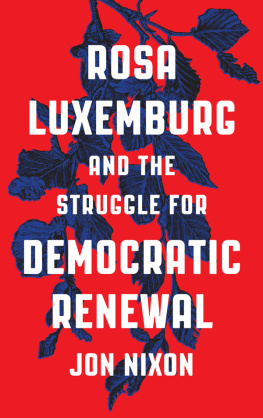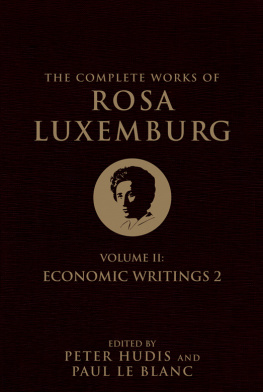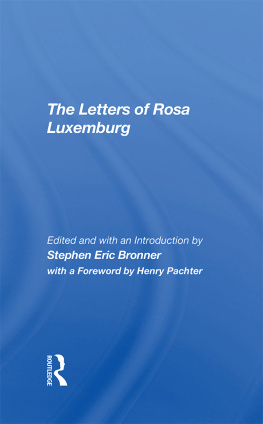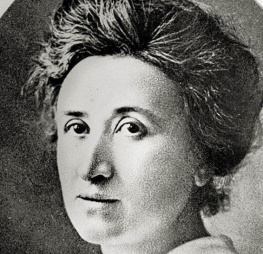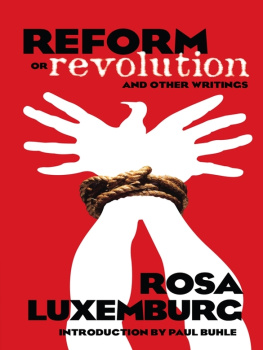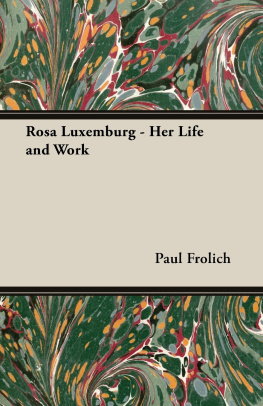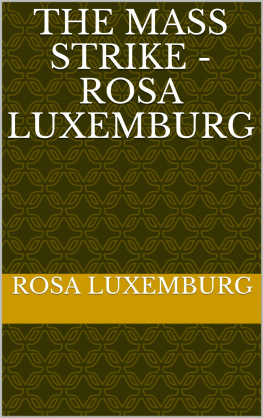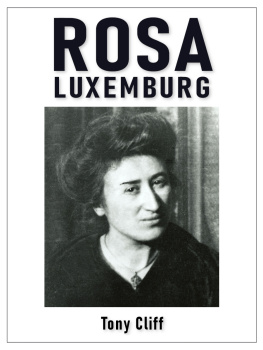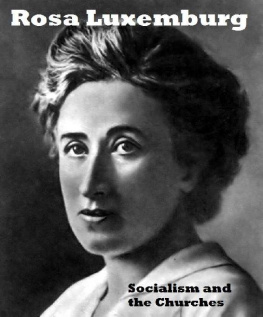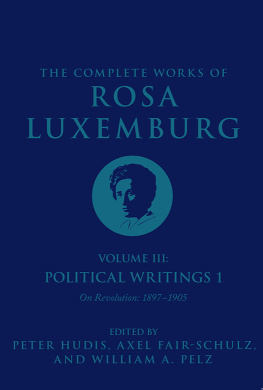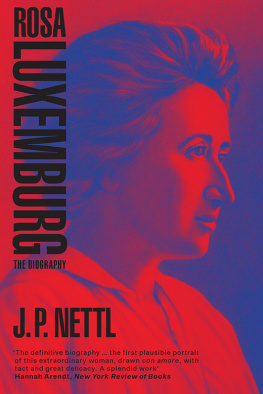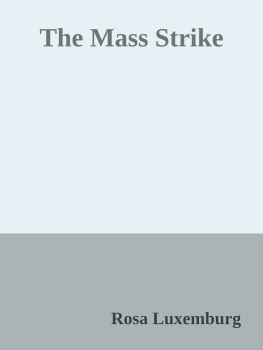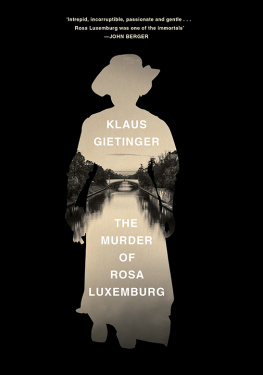Luxemburg Rosa - Rosa Luxemburg and the Struggle for Democratic Renewal
Here you can read online Luxemburg Rosa - Rosa Luxemburg and the Struggle for Democratic Renewal full text of the book (entire story) in english for free. Download pdf and epub, get meaning, cover and reviews about this ebook. City: London, year: 2018, publisher: Pluto Press, genre: Politics. Description of the work, (preface) as well as reviews are available. Best literature library LitArk.com created for fans of good reading and offers a wide selection of genres:
Romance novel
Science fiction
Adventure
Detective
Science
History
Home and family
Prose
Art
Politics
Computer
Non-fiction
Religion
Business
Children
Humor
Choose a favorite category and find really read worthwhile books. Enjoy immersion in the world of imagination, feel the emotions of the characters or learn something new for yourself, make an fascinating discovery.
- Book:Rosa Luxemburg and the Struggle for Democratic Renewal
- Author:
- Publisher:Pluto Press
- Genre:
- Year:2018
- City:London
- Rating:5 / 5
- Favourites:Add to favourites
- Your mark:
- 100
- 1
- 2
- 3
- 4
- 5
Rosa Luxemburg and the Struggle for Democratic Renewal: summary, description and annotation
We offer to read an annotation, description, summary or preface (depends on what the author of the book "Rosa Luxemburg and the Struggle for Democratic Renewal" wrote himself). If you haven't found the necessary information about the book — write in the comments, we will try to find it.
Rosa Luxemburg and the Struggle for Democratic Renewal — read online for free the complete book (whole text) full work
Below is the text of the book, divided by pages. System saving the place of the last page read, allows you to conveniently read the book "Rosa Luxemburg and the Struggle for Democratic Renewal" online for free, without having to search again every time where you left off. Put a bookmark, and you can go to the page where you finished reading at any time.
Font size:
Interval:
Bookmark:

Rosa Luxemburg and the Struggle for Democratic Renewal
Jon Nixon

First published 2018 by Pluto Press
345 Archway Road, London N6 5AA
www.plutobooks.com
Copyright Jon Nixon 2018
The right of Jon Nixon to be identified as the author of this work has been asserted by him in accordance with the Copyright, Designs and Patents Act 1988.
British Library Cataloguing in Publication Data
A catalogue record for this book is available from the British Library
ISBN 978 0 7453 3652 7 Hardback
ISBN 978 0 7453 3647 3 Paperback
ISBN 978 1 7868 0194 4 PDF eBook
ISBN 978 1 7868 0228 6 Kindle eBook
ISBN 978 1 7868 0227 9 EPUB eBook
This book is printed on paper suitable for recycling and made from fully managed and sustained forest sources. Logging, pulping and manufacturing processes are expected to conform to the environmental standards of the country of origin.
Typeset by Stanford DTP Services, Northampton, England
Simultaneously printed in the United Kingdom and United States of America
for
Pauline
There are many Rosa Luxemburgs: the legendary Red Rosa of the barricades; the tragic victim of historical forces beyond her control; the closet anarchist who celebrated spontaneity at the expense of organised action; the unwitting stooge of the Bolsheviks; the martyr to state violence and political opportunism; the apostate who dared to question the precepts of orthodox Marxism But there is also the Rosa Luxemburg, who thought her way through one of the most critical periods of German history and for whom thinking formed the basis of political action. This is the Rosa Luxemburg with whom this book is concerned.
The problem that Luxemburg grappled with throughout her life was how to reconcile her deep commitment to two traditions of political thought and action: democracy and socialism. Was it possible to be a democrat when democracy had become a cover for protecting and reproducing the privilege of the ruling elite? Was it possible to be a socialist when socialism relegated the proletariat to the status of foot soldiers under the leadership of a supposedly enlightened vanguard?
She inveighed against bourgeois democracy and warned against the centralising tendencies inherent in socialism, but she never wavered in her belief that democratic socialism was a possibility. To think as a socialist, she maintained, is to view history from the perspective of the oppressed; to think as a democrat is to acknowledge the agency of the oppressed in the making of history; to think as a democratic socialist is to think and act in solidarity with the oppressed in the overcoming of their oppression.
To think in such a way is to think internationally and inter-culturally and to value the unpredictability and spontaneity of human agency. These twin themes international solidarity and the spontaneity of revolutionary action are the hallmarks of Luxemburgs thinking. They are her enduring legacy, but they only make sense in the light of her deeply humanistic strain of thought. If Luxemburg was a socialist and a democrat, she was also an uncompromising humanist in her insistence on the human potential for social and political transformation.
It was a transformation, she maintained, that could only be achieved through the consciousness of the oppressed: the economically impoverished, the politically disenfranchised and the socially excluded. It was only from the consciousness of the powerless that a more rational, humane and just society could emerge. They alone had the capacity to think the unthinkable.
What are we to make of this socialist, who took issue with the leading socialists of her time? This democrat, who inveighed against the moral and political bankruptcy of parliamentary democracy? This humanist, who rejected the individualistic assumptions implicit in the Enlightenment project? She was difficult intriguingly difficult but was she anything more than this? Did the difficulty that she presented in her own person and her own thinking add up to a critique from which we can learn and a sense of purpose from which we can move forward?
Our starting point is the work embedded in the life and the life embedded in the history: a complex and riven history that tore Europe apart, unleashed the unprecedented horrors of the First World War, and saw the re-emergence of fascism in the form of Nazism as a potential world power. Luxemburg stood at the tipping point of history as it dipped into the horrors of what Eric Hobsbawm termed the short twentieth century: the rough ground between the commencement of the First World War and the collapse of Communism. Luxemburg exited not of her own free will towards the beginning of that history but her life and work continue to resonate.
left; the questions she continues to pose; and the ways forward to which she tentatively directs us.
Jon Nixon
Kendal, Cumbria
September 2017
I would like to thank David Castle and the team at Pluto Press for believing in this book and in my capacity to produce it. Thanks, also, to the anonymous reviewers whose comments were helpful, informative and insightful.
I owe a great debt of gratitude to Stewart Ranson whose friendship, encouragement and generosity have supported me throughout the drafting of this book. Fred Ingliss encouragement and support in the early stages of the project were also invaluable.
Thanks to Amy Robinson, Anne Corbett, Ari-Elmeri Hyvnen, Camilla Erskine, Claus Emmeche, Derek Heather, Di Ponti, Feng Su, Helen Gunter, Jae Park, Judith Ashman, Maha Bali, Margaret Wood, Marnie Holborow, Paul Gibbs, Ronald Barnett, Stephen Powell, Tamara Savelyeva, Tanya Fitzgerald, Wayne Veck and William Fisher for the good talk, intellectual friendship and support along the way. Without our ongoing but necessarily intermittent conversations, this book would have been thinner in every way.
Dave Cope generously allowed me access to his superb archive of labour history and literature, while Derek Robinson kindly rooted out relevant books from his magnificent collection. Cumbria Library Service has as always proved an invaluable resource.
I remember, also, in gratitude, the late Dora Bannister, Harold Rosen, Jean Rudduck and Lawrence Stenhouse, who taught me some hard lessons in how to think and write.
Finally, my thanks to Pauline Nixon for being there, and, in her immense generosity of spirit, for allowing the space and time necessary for this project to come to fruition.
I have, in the main, introduced individuals using their full name and thereafter referred to them by their surname the exception being when a forename is required to distinguish individuals with the same surname or on the rare occasions when either a full name or forename seems appropriate within the given context. The Glossary is intended to help readers with historical references, frequently used acronyms relating to organisations and key individuals referred to more than once.
And finally, one must take history as it comes, whatever course it takes
Rosa Luxemburg, 11 January 1919, letter to Clara Zetkin (R: 492)
Font size:
Interval:
Bookmark:
Similar books «Rosa Luxemburg and the Struggle for Democratic Renewal»
Look at similar books to Rosa Luxemburg and the Struggle for Democratic Renewal. We have selected literature similar in name and meaning in the hope of providing readers with more options to find new, interesting, not yet read works.
Discussion, reviews of the book Rosa Luxemburg and the Struggle for Democratic Renewal and just readers' own opinions. Leave your comments, write what you think about the work, its meaning or the main characters. Specify what exactly you liked and what you didn't like, and why you think so.

